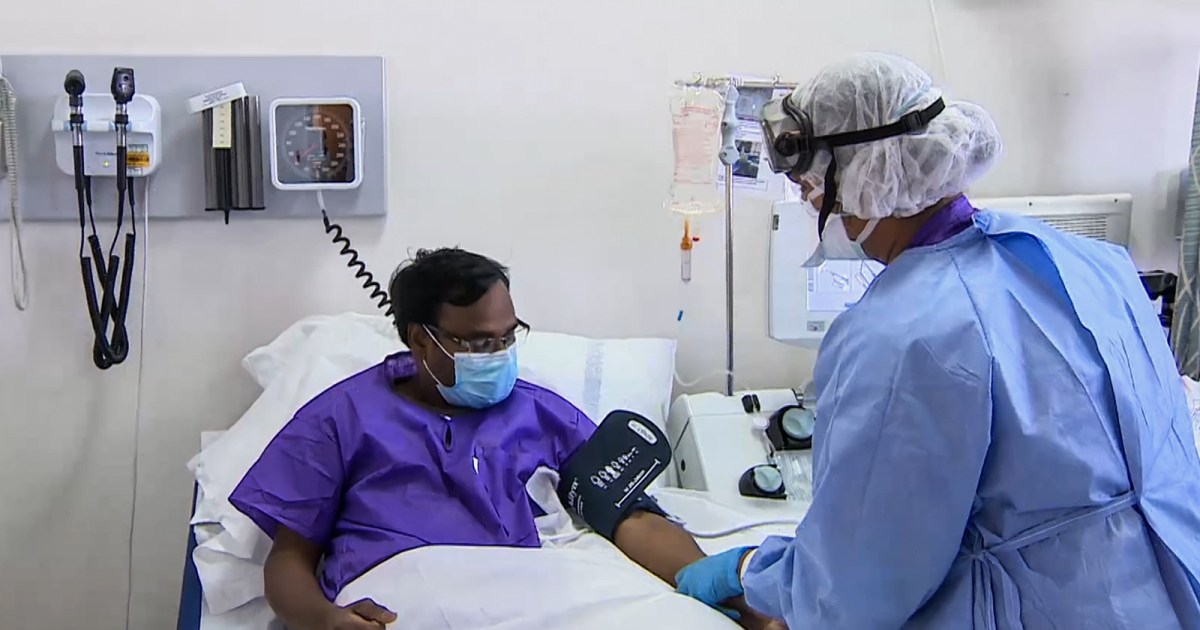LONDON -
While Britain continues to lead the world in terms of the number of vaccinators (70% received two doses), there are still individuals suffering from long-term Corona disease syndrome, (long Covid), as British studies revealed that a number of Britons suffer from complications Healthy ones stay with them for months.
Six months ago, Muhammad Al-Nasser went to the clinic to get medicines to regulate his heart rate, whose system was confused after he was infected with the Corona virus for months, and despite the virus leaving his body, complications are still present, from shortness of breath, to rapid heartbeat, to chronic pain in the head.
“Before contracting the virus, I never suffered from constant fatigue to the point that I could no longer walk for a quarter of an hour, in addition to problems with concentration and rapid heart rate,” Muhammad Al-Nasser describes his condition for months due to the Corona virus, “after leaving the hospital, and these symptoms persisted for more than a month. I was diagnosed with long-term Covid syndrome."
Statistics from the British health authorities show that one out of every 100 people infected with the Corona virus suffers from this syndrome, which may extend from a month to one year.
What is this syndrome?
Mays Absi, an epidemiologist at the Imperial University of London, defines long-term corona syndrome as a group of symptoms that persist with a person infected with the Corona virus for more than 4 weeks, and more than 200 symptoms have been counted, affecting more than 9 organs in the body and continuing For a year for some people.
The doctor pointed out that a study she reviewed indicated that 50% of those infected with the virus from young people under the age of 30 suffer from this syndrome.
As for Dr. Nihal Abu Seif, a consultant in internal and acute diseases at Birmingham Hospital, she confirms to Al Jazeera Net, that they consider anyone who has exceeded a month and still suffers from symptoms of Corona that he suffers from this syndrome, "because the extent of recovery from the virus is 10 days."
What are its symptoms?
Dr. Mays confirms that these symptoms stem from the brain, especially the so-called “brain fog” which is manifested in loss of focus, depression and anxiety, in addition to rapid heart rate, and second-degree diabetes, “and an important percentage of those who recover from the virus continue with these symptoms for a year. almost".
Dr. Nihal Abu-Saif confirms that the cases monitored by her team suffer from "severe chest pains, high temperature that does not decrease quickly, loss of sense of smell and taste for a long time, in addition to rashes in different areas of the body."
What are its causes?
Dr. Mais Absi puts 3 possible causes for this syndrome, which are still being studied, the first of which is that part of the virus binds to receptors in different organs of the body, the most important of which are blood vessels, and continues to spread for a long time.
As for the second reason, it is the indirect effect of the virus on the body’s immune system, as the immune reaction of some people to confront the virus is out of control and leads to what doctors call an inflammatory condition where it is difficult to control the body’s reaction in terms of immunity.
The third reason is that the white blood cells that play the role of the policeman in the body to rid it of foreign bodies, in the case of infection with the Corona virus, in some cases they remain next to the blood vessels for a long time and the virus uses them as crossing points towards the blood vessels and from them towards the organs of the body, and it is difficult for doctors to deal with this case.
Is there a cure?
Dr. Mais Absi and Dr. Nihal Abu Seif agree that there is no single treatment to deal with the long-term corona syndrome, but Dr. Mais confirms that there is a program to deal with cases suffering from this syndrome for a period of one year, and it is called the rehabilitation program, because some of them He even loses the ability to walk.
She added that there are some promising drugs that help treat this syndrome, including "statins", in addition to some medications to treat anxiety and depression, "but in general, there is no single prescription for treating this syndrome, but currently there is also work on a mixture of antibodies that gives The results are impressive and it helps patients, especially those who arrive at the hospital.”
Dr. Nihal considers that people suffering from this syndrome "do not need to go to the hospital, but only get medicines from their own clinic, such as painkillers and heart pacemakers," adding that the extensive vaccination process taking place in Britain contributes significantly to the decline in the number of infected people. With this syndrome, "Unfortunately, most of the cases that we currently receive are unvaccinated cases only because they believed the misleading advertisements about vaccines."

